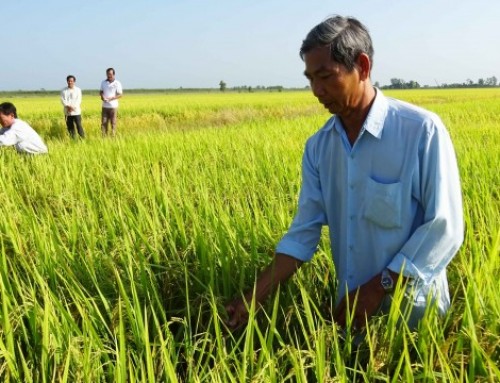Partnership project to promote organic value chain in Vietnam

A strategic alliance between German organic companies and private-sector actors in Vietnam, so called Organic Value Chain Partnership (OVCP), is soon to be set up with the mandate of the German Federal Ministry for Economic Cooperation and Development (BMZ), the Deutsche Gesellschaft für Internationale Zusammenarbeit (GIZ) – Sector Project “Agricultural Trade and Agricultural Value Chains”. Its aim is to realize multi-year projects promoting different organic value chains in Vietnam.

Dragonfruit fields and cattle stable
In the context of growing organic markets in Europe as well as developing and emerging countries, the organic sector in Germany is becoming increasingly interested in sourcing from the BMZ partner country Vietnam. These private-sector actors have a need for reliable, sustainable and certified sources of production. Promoting organic value chains including the trade of these products in Europe can contribute to income growth, promotion of employment, sustainable management of natural resources, local value added as well as improved food safety and quality.
As part of the project initialization, GIZ – Sector Project “Agricultural Trade and Agricultural Value Chains”, with support from the ASEAN Sustainable Agrifood Systems (ASEAN SAS) project in Vietnam recently conducted two market studies on the Vietnamese organic sector and one German organic company visiting tour from July to October 2015 in the south of Vietnam. The objective of these activities is to get a reliable assessment of the current conditions of the organic sector in Vietnam and to identify potential entry points for value chain development in the sector.

organic coconut intercroping with cocoa orchard
The next steps concerning OVCP in Vietnam include:
- Follow-up possibility discussion with German organic companies about which impressions they got during the mission within their companies then report back to the Sector Project where they see the most interesting opportunities for a project.
- Based on their feedback, the Sector Project will prioritize and decide which projects will be developed further. By mid-November, project concepts will be sketched which will define what are the specific roles, responsibilities and inputs of both the private partners and GIZ will look like. This should then provide a good basis for further discussions with the local partners.
The aim is to get the final permission for the Strategic Alliance from BMZ until the end of this year (2015) and beginning of next year in order to being able to start with the implementation of the project(s) early 2016.





